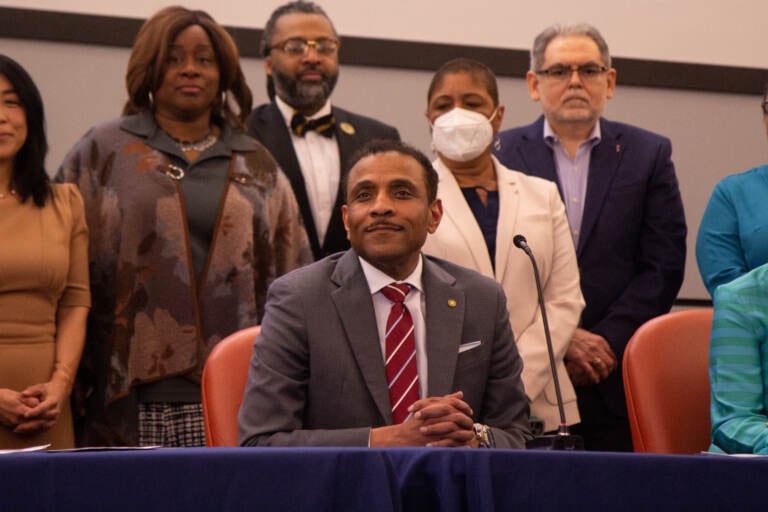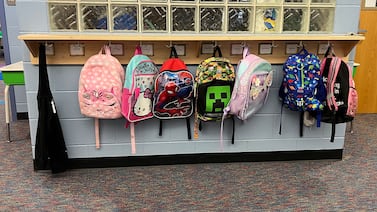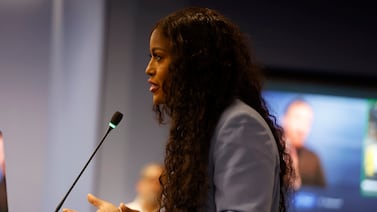Tony B. Watlington Sr. is coming to Philadelphia to lead a 120,000-student school district that’s facing significant teacher resignations, crumbling buildings, and high dropout rates. He will inherit these and other pressing issues when he takes over one of the nation’s 20 largest school districts in what is considered the poorest big city in the U.S.
Though his superintendency begins June 16, Watlington is currently spending two days a week visiting the city either in person or remotely so he can acclimate to Philadelphia schools. For now, he’s still employed as superintendent of North Carolina’s Rowan-Salisbury school district northeast of Charlotte.
Watlington has acknowledged that he knows little about Philadelphia, yet he is “looking forward to listening and learning.” After his appointment, Chalkbeat asked students, parents, and educators to tell us what Watlington should know about their schools and what his priorities should be. Around 40 people responded.
Their top concerns ranged from more mental health resources for students to improving the working environment for teachers. They also highlighted the importance of improving low standardized test scores, re-establishing trust, and community engagement. School start times and busing were also points of concern.
Watlington will take over a district dealing with learning loss and other pandemic-related education issues; aging and deteriorating buildings; gun violence; teacher turnover; a constant battle for adequate funding; and revisions of its admissions policy for selective high schools.
During his discussions with parent and student groups before the district hired him, Watlington said he views “high-quality teachers” as key to improving schools, and believes teachers should be paid more. Teachers in Chalkbeat’s callout, however, spoke of eliminating large class sizes, providing more support for special education, and addressing verbal and physical threats from parents and students.
In their response, students expressed concerns about building safety, especially around asbestos, and keeping fellow classmates safe from gun violence.
Q: What is one issue you are facing at your school that you want Watlington to prioritize addressing in his first year?
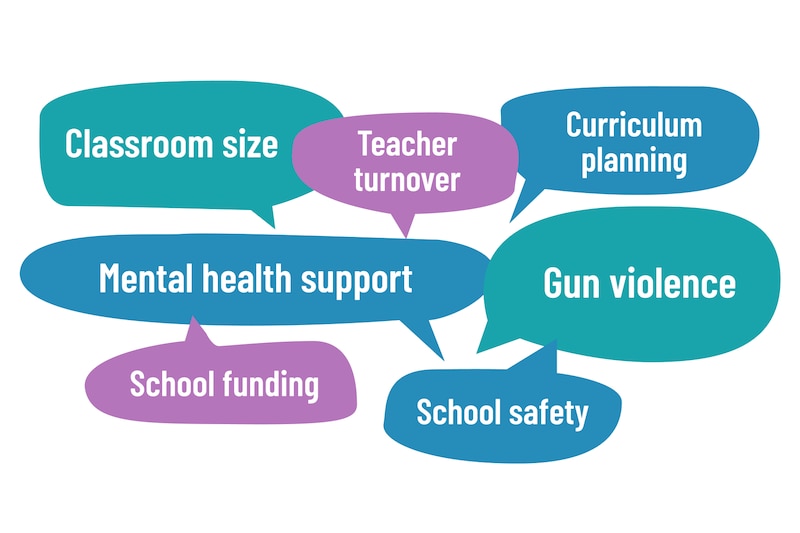
“We know from research that the student-teacher relationship has a huge impact on both social-emotional and academic outcomes for students. Prioritizing a smaller class and smaller ratios will help both staff and students to do well,” — Kirstin Peth, parent at Fanny Jackson Coppin School

“I also want to know how Dr. Watlington plans to keep students safe from the outrageous gun violence,” — Jemair McKay, a senior at Roxborough High School
“This year we have had six teachers quit. We have received no teachers to replace them. This puts a tremendous burden on the staff to support children who do not have a teacher. We need policies around pay, teacher training, and teacher support that will allow more teachers to feel successful in their classrooms and stay at their schools,” — Katy Egan, educator and school leader at a Philadelphia elementary school
“Addressing gun violence and the over-policing of students in schools. Expanding extracurriculars and creative arts courses in neighborhood schools,” — Fatima Hmada, community member in Philadelphia
“Schools are struggling and the district cut roles, again. Fight the state tooth and nail for equitable funding. I’m excited to see what the new superintendent will do,” — Phil Walton, parent of a Philadelphia student
Q: What is one action Watlington could take as leader of Philadelphia schools that would improve learning for you and/or students?
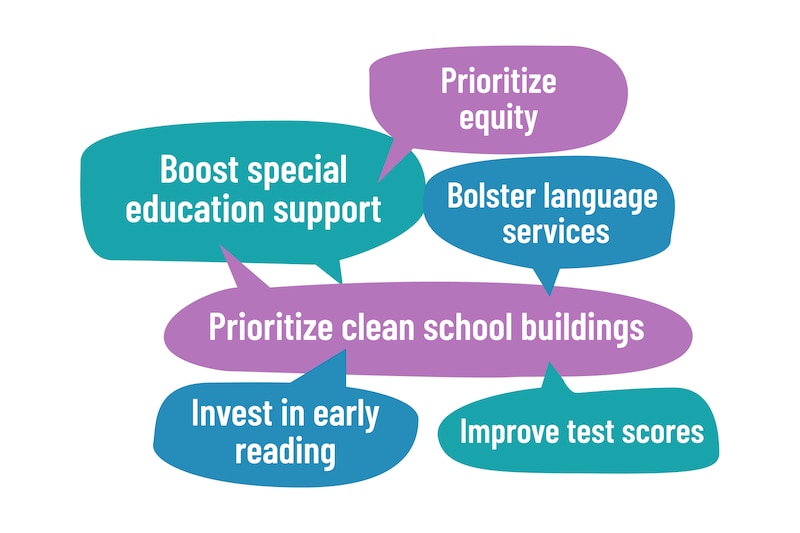
“This pertains to our entire district, not my school specifically. We need more special education support, as about 15 percent of our student body has a disability classification. Specifically, we need something similar to the district’s Equity Coalition for special education, where the district directly prioritizes equity for students with disabilities and creates resources for teachers and students that support inclusion. We also need to take into account that so many of our students share multiple marginalized identities. It would be great if the district supplied materials that specifically address equity for students who share multiple identities including disability — for example students who are both Black and autistic, queer and intellectually disabled, deaf and English language learners.,” — Tamara Sepe, speech language pathologist at Charles W. Henry School
“Actually clean and disinfect, especially when we know COVID and its many variants are still out there,” — Gwen Blackshear, educator at a high school in Philadelphia
“Building repairs, specifically ventilation improvements. Acknowledge the deficiencies of our infrastructure and funding,” — Lizzie Rothwell, parent at Henry Lea Elementary School

“Focus on all kids in Philadelphia reading on grade level by third grade and make things easier on schools. Support schools across the district in adopting evidence-based language arts curriculums, ensure all schools have reading support specialists, and provide teacher training and resources in line with the science of reading,” — Patty Slutsky, parent at Nebinger Elementary School
“I would like there to be a review of the quality of services, or lack of quality, for English language learners, particularly for high-school-age learners coming from countries where they have had very limited education,” — Cheri Micheau, community member in Philadelphia and previous administrator in the district’s Office of Multilingual Curriculum and Programs
“Disability Accommodations. Many students, including some of my friends, have received a lesser educational experience because they do not have adequate accommodations for their physical or learning disabilities,” — Eleanor Zdancewic, student in Philadelphia
Q: How could Watlington help restore or strengthen your trust in the school system and leadership?
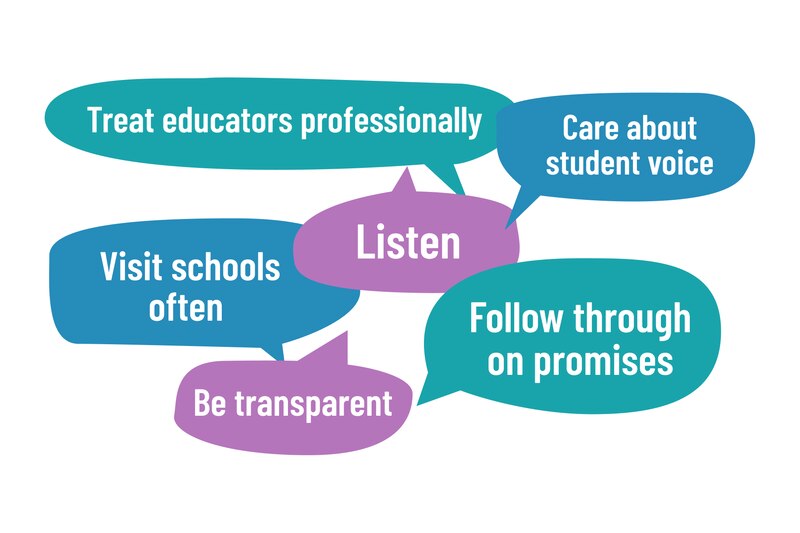
“Mr. Watlington can visit the schools and speak with the staff, parents, and students to understand the school dynamics, needs, and concerns. Partnerships are key to having a successful school district,” — Teeyona Crumpton, parent and school leader at W.B. Saul High School and First Philadelphia Preparatory Charter School
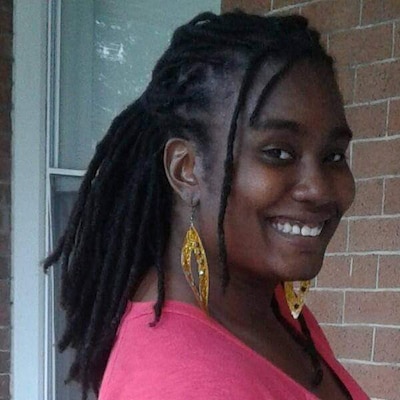
“I hope our new superintendent will have integrity: if we say we value student mental health, let’s actually act like it by putting resources in place that follow through on that. If we value achievement, lower class size so teachers can differentiate,” — Kirstin Peth, parent at Fanny Jackson Coppin School
“Increase student voice involvement on major decisions. Honestly and genuinely make a connection with students compared to speaking to us like a politician,” — Eleanor Zdancewic, student in Philadelphia

“Listen to educators as we are the ones who work with the children the most on a daily basis during the school year. Many educators feel leadership, from district level to school level, does not trust us to do our jobs and listen to our input. There’s no sense of collaboration or togetherness when educators are pushed to the side,” — Edwin Thomas Minguela, elementary school educator in Philadelphia
“If our new superintendent is not able to bring in the voices of community members, teachers, and parents, he will not gain the necessary trust,” — Cheri Micheau, community member in Philadelphia
“Create transparency in all these financial contracts to outside consultants,” — Michele Rossi, parent at Thomas Mifflin K-8 School
Caroline Bauman connects Chalkbeat journalists with our readers as the community engagement manager and previously reported at Chalkbeat Tennessee. Connect with Caroline at cbauman@chalkbeat.org.
Bureau Chief Johann Calhoun covers K-12 schools and early childhood education in Philadelphia. He oversees Chalkbeat Philadelphia’s education coverage. Contact Johann at jcalhoun@chalkbeat.org.

